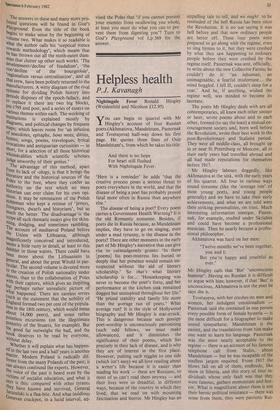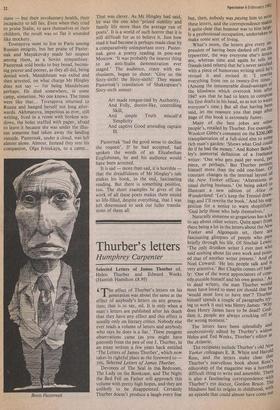Helpless health
P.J. Kavanagh
Nightingale Fever Ronald Hingley (Weidenfeld and Nicolson £12.95)
You can begin to quarrel with Mr Hingley's account of four Russian poets (Akhmatova, Mandelstam, Pasternak and Tsvetayeva) half-way down his first page. He quotes three lines of Osip Mandelstam's, from which he takes his title:
And there is no hope For heart still flushed With Nightingale Fever.
'Here is a reminder' he adds 'that the creative process poses a serious threat to poets everywhere in the world, and that the disease of being a poet has probably proved fatal more often in Russia than anywhere else.'
The disease of being a poet? Every poem carries a Government Health Warning? It is the old Romantic nonsense. Besides, if poets die in Russia because, as Mandelstam implies, they have to go on singing, even under a mad tyranny, is the disease in the poets? There are other moments in the early part of Mr Hingley's narrative that can give rise to curmudgeonly grunts: 'In these [poems] his poet-mistress lies buried so deeply that her presence would remain un- suspected without the aid of literary scholarship.' So that's what literary scholarship is for... 'Housekeeping was never to become the poet's forte, and her performance at the kitchen sink remained dogged but uninspired throughout her life.' 'He prized stability and family life more than the average run of poets.' What average run? It is the style of Hollywood biography and Mr Hingley is star-struck. This is dangerous because such gossipy poet-worship is unconsciously patronising (such odd fellows, we must make allowances), and it diminishes the significance of their poems, which lies precisely in their lack of disease, and is why they are of interest in the first place. However, putting such niggles to one side (which isn't easy) we all love reading about a writer's life because it is easier than reading his work — these are Russians, so most of us can't read them anyway — and their lives were so dreadful, in different ways, because of the country in which they lived, that we read on with mounting fascination and horror. Mr Hingley has an appalling tale to tell, and we ought to be reminded of the hell Russia has been since
the Revolution. It is no use saying it was hell before and that now ordinary people are better off. These four poets were prepared to go along with the regime, even to sing hymns to it, but they were crushed by what they saw happening to ordinary people before they were crushed by the regime itself. Pasternak was sent, officially, to write about the new Collective Farms; he couldn't do it: 'an inhuman, an unimaginable, a fearful misfortune... the mind boggled. I fell ill, couldn't sleep for a year.' And he, if anything, wished the regime well, was minded to become its laureate.
The poets Mr Hingley deals with are all contemporaries, all knew each other sooner or later, wrote poems about and to each other, formed (to say the least) a mutual en- couragement society and, born well before the Revolution, wrote their best work in the post-Revolutionary and Stalinist period.
They were all middle-class, all brought up in or near St Petersburg or Moscow, all in their early years had travelled abroad and all had made reputations for themselves before 1917.
Mr Hingley labours doggedly, like Akhmatova at the sink, with the early years of his quartet. All four in various ways sound tiresome (like the 'average run' of most young poets, and young people generally) and we have to take their early achievements, and what we are told were their striking personalities, on trust. Much interesting information emerges. Paster- nak, for example, studied under Skriabin and could have become a professional musician. Then he nearly became a profes- sional philosopher.
Akhmatova was hard on her men: 'Twelve months we've been together, you and I; But you're happy and youthful as ever.'
Mr Hingley calls that 'But' unconscious humour'. Having no Russian it is difficult to argue with him; however, if that 'But' is unconscious, Akhmatova is not the poet he says she is.
Tsvetayeva, with her crushes on men and women, her indulgent emotionalism — Pasternak said she contained in one person every possible form of female hysteria — is the most difficult for a biographer to make sound sympathetic. Mandelstam is the easiest, and the translations from him make one want to learn his language. Pasternak was the most nearly acceptable to the regime — there is an account of his famous telephone call from Stalin, about Mandelstam — but he was incapable of the soulless jargon required. From 1917 the blows fall on all of them, endlessly, like snow in Siberia, and this story of four in- dividuals whose only fault was that they were famous, gathers momentum and hor- ror. What is magnificent about them is not their heroic political resistance — there was none from them, they were patriotic Rus- sians — but their involuntary health, their incapacity to tell lies. Even when they tried to praise Stalin, to save themselves or their children, the result was so flat it sounded like mockery.
Tsvetayeva went to live in Paris among Russian emigres, but her praise of Paster- nak and Mayakovsky made her suspect among them, as a Soviet sympathiser. Pasternak sold books to buy bread, becom- ing poorer and poorer, as they all did, being denied work. Mandelstam was exiled and then arrested, on what charge Mr Hingley does not say — for being Mandelstam perhaps. He died somewhere, in some camp, sometime. No one knows. The times were like that... Tsvetayeva returned to Russia and hanged herself not long after- wards. Akhmatova, imperious as ever, still writing, lived in a room with broken win- dows, the holes stuffed with paper, afraid to leave it because she was under the illus- ion someone had taken away the landing outside. Pasternak, under a cloud, was left almost alone. Almost. Instead they sent his companion, Olga Ivinskaya, to a camp... That was clever. As Mr Hingley had said, he was the one who 'prized stability and family life more than the average run of poets'. It is a world of such horror that it is still difficult for us to believe it. Just how mad it had become is perhaps made clear by a comparatively unimportant story. Paster- nak gave a poetry reading in post-war Moscow. 'It was probably the nearest thing to an anti-Stalin demonstration ever staged.' The audience, crazy with en- thusiasm, began to shout: 'Give us the Sixty-sixth! the Sixty-sixth!' They meant Pasternak's translation of Shakespeare's Sixty-sixth sonnet: Art made tongue-tied by Authority, And Folly, doctor-like, controlling Skill, And simple Truth miscall'd Simplicity And captive Good attending captain Ill.
Pasternak 'had the good sense to decline the request'. If he had accepted, had spoken the words of an Elizabethan Englishman, he and his audience would have been arrested.
It is sad — more than sad, it is horrible that the dreadfulness of Mr Hingley's tale makes his book, in the end, fascinating reading. But there is something positive, too. The short examples he gives of the work of all these poets makes them sound so life-filled, despite everything, that I was left determined to seek out fuller transla- tions of them all.

























 Previous page
Previous page